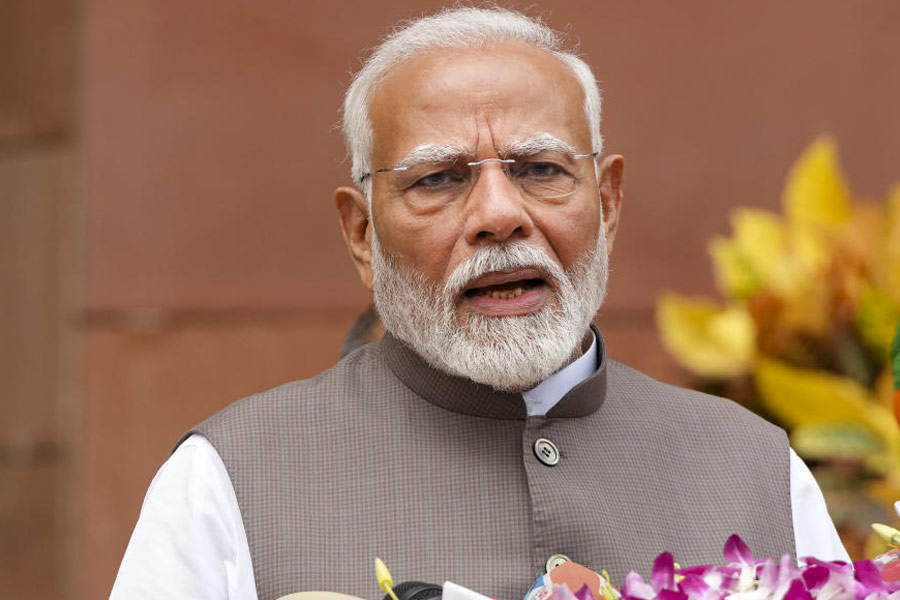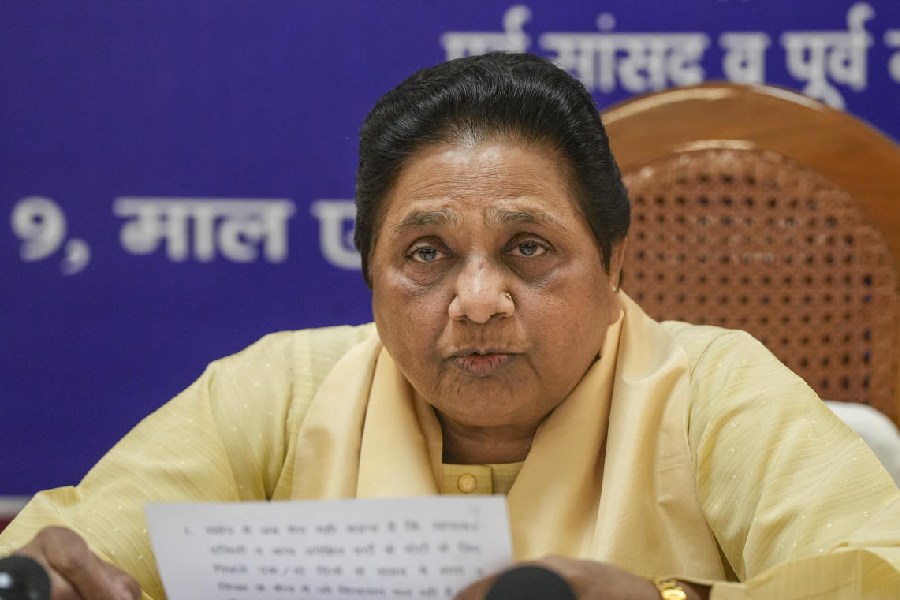RADICAL REVIEW: The Rashtriya Swayamsewak Sangh (RSS) has been handed an audacious — and portentous — warrant of legitimacy by the Narendra Modi-led NDA coalition.
In brazen defiance of its reduced electoral mandate — and perhaps in a nod to the RSS centenary next year — the Modi regime has, through a seemingly innocuous order floated quietly on July 9, lifted the 58-year-old bar on government employees participating in activities of the Sangh Parivar fountainhead. The radical move comes at a time when the RSS leadership has been taking oblique swipes at Modi, and is being seen as an olive branch to the BJP’s parent organisation.
But the decision to dismantle separation and open access between the RSS and the government machinery has potential implications that far outride the inner dynamics of Sangh outfits. For a start it gives the RSS unprecedented access not only to policy and decision-making processes but also to reshaping the framework of India’s future, which is a distinct departure from the Gandhi-Nehru worldview.
Banned multiple times — the first among them imposed by Sardar Vallabhbhai Patel immediately after the assassination of Mahatma Gandhi in 1948 — the RSS has never
really shaken off its image as an organisation whose workings were opaque and whose philosophy remained averse, if not also inimical, to a secular, pluralist nation such as India constitutionally is. Its embrace of majoritarian Akhand Bharat ambitions is widely known.
None of Modi’s NDA allies, who are the crutch on which the BJP’s minority government stands, have yet even appeared to take notice, much less object to the manner in which the government’s exposure to the RSS and its ideas and activities has been legitimised. Clearly, on the evidence so far, Modi is proceeding with the implementation of his intended agenda unmindful of the downgraded verdict of
the electorate.
The July 9 office memorandum (OM) was made public by the Congress on Sunday via X. “Sardar Patel had banned the RSS in February 1948 following Gandhiji’s assassination. Subsequently, the ban was withdrawn on assurances of good behaviour. Even after this the RSS never flew the Tiranga in Nagpur. In 1966, a ban was imposed — and rightly so — on government employees taking part in RSS activities. After June 4th 2024, relations between the self-anointed non-biological PM and the RSS have nosedived. On July 9, 2024, the 58-year ban that was in force even during Mr Vajpayee’s tenure as PM was removed. The bureaucracy can now come in knickers too I suppose,” the Congress media head, Jairam Ramesh, posted on X along with an image of the new OM. (Since 2002, the Tricolour has been hoisted at the RSS headquarters in Nagpur).
Lok Sabha MP from Hyderabad, Asaduddin Owaisi of the AIMIM, said on X: “If true, this is against India’s integrity and unity. The ban on RSS exists because it had originally refused to accept the Constitution, the national flag & the national anthem. Every RSS member takes an oath that puts Hindutva above the nation. No civil servant can be loyal to the nation if he is a member of RSS.”
Owaisi was referring to the fact that the Government of India under then home minister Sardar Patel had in 1949 made the RSS commit to accepting the Constitution of India and the Tricolour as pre-conditions for lifting the ban imposed on the organisation immediately after the assassination of Mahatma Gandhi in 1948.
As per the DoPT office memorandum of July 9, the instructions in the office memoranda (OMs) of November 30, 1966; July 25, 1970; and October 28, 1980, have been reviewed and "it has been decided to remove the mention of Rashtriya Swayam Sevak Sangh from the impugned OMs…"
The original OM of 1966 — issued by the home ministry — pertained to association of government servants with the activities of the RSS and the Jamat-e-Islami. It invoked provisions of the Central Civil Services (Conduct) Rules, 1964, as per which "no Government servant shall be a member of, or be otherwise associated with, any political party or any organisation which takes part in politics nor shall he take part in, subscribe in aid of, or assist in any other manner, any political movement or activity".
The original OM was issued as a response to questions that were being raised at that time about the government’s policy vis-à-vis the membership of and participation in the activities of the two organisations — the RSS and the Jamat, both of which were political in a pronounced fashion but wore such labels as “cultural” or “social” organisations.
"Any government servant, who is a member of or is otherwise associated with the aforesaid organisations or with their activities is liable to disciplinary action," the original OM said.
The response to the Modi government’s decision was along predictable lines across the political spectrum. It was welcomed by the RSS. In a statement, Sunil Ambekar, Akhil Bharatiya Prachar Pramukh of the RSS, recalled the role of the organisation and said: "Due to their political self-interests, the then-government unjustly prohibited government employees from participating in the activities of a constructive organisation like the RSS. The recent decision of the Government is appropriate and will strengthen the democratic system of Bharat."
This apart, the Sangh Parivar has for long struggled to dissociate from its early contacts with fascism; primarily sourced to the diary entries of Hindu Mahasabha leader B.S. Moonje who had also met Mussolini. Being the most prominent of Sangh Parivar organisations, the RSS also has to bear the fallout of the Mahasabha’s statements and actions.
"The Balilla institutions (Italian Fascist youth movement) and the conception of the whole organisation have appealed to me most, though there is still not discipline and organisation of high order. The whole idea is conceived by Mussolini for the military regeneration of Italy. Italians, by nature, appear ease-loving and non-martial like the Indians generally. They have cultivated, like Indians, the work of peace and neglected the cultivation of the art of war. Mussolini saw the essential weakness of his country and conceived the idea of the Balilla organisation. Nothing better could have been conceived for the military organisation of Italy. The idea of fascism vividly brings out the conception of unity amongst people. India and particularly Hindu India need some such institution for the military regeneration of the Hindus,’’ Moonje had written.










